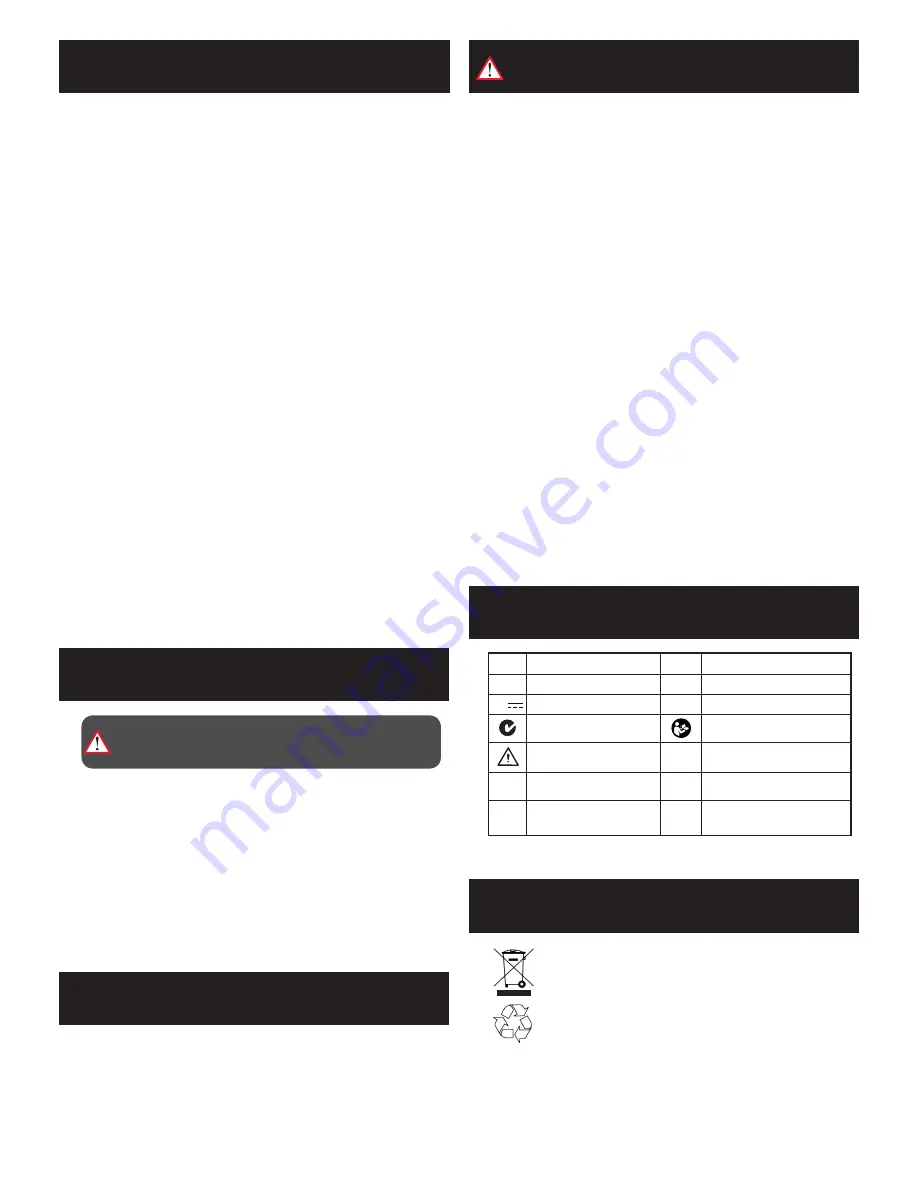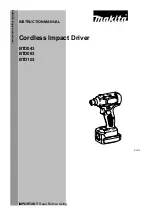
Power tools that are no longer usable should not be disposed of
with household waste but in an environmentally friendly way. Please
recycle where facilities exist. Check with your local council authority
for recycling advice.
Recycling packaging reduces the need for landfill and raw materials.
Reuse of recycled material decreases pollution in the environment.
Please recycle packaging where facilities exist. Check with your
local council authority for recycling advice.
DESCRIPTION OF SYMBOLS
CARING FOR THE ENVIRONMENT
BATTERY & CHARGER SAFETY WARNINGS
TROUBLESHOOTING
Spare parts can be ordered from the Special Orders Desk
at your local Bunnings Warehouse.
For further information, or any parts not listed here, visit
www.ozito.com.au or contact Ozito Customer Service:
Australia 1800 069 486
New Zealand 0508 069 486
E-mail: enquires@ozito.com.au
SPARE PARTS
THIS MANUAL CONTAINS IMPORTANT SAFETY AND OPERATING
INSTRUCTIONS FOR YOUR
BATTERY CHARGER.
1.
Before using the charger read all instructions and cautionary markings on the
charger, battery pack and the product using the battery pack.
2.
This charger is not intended for any uses other than charging rechargeable batter-
ies. Any other use may result in risk of fire, electric shock or electrocution.
3.
Do not place any object on top of the charger or place the charger on a soft
surface that may result in excessive internal heat. Place the charger in a position
away from any heat source.
4.
To reduce risk of damage to the electric plug and cord, pull by the plug rather than
the cord when disconnecting the charger.
5.
Make sure the cord is located so that it will not be stepped on, tripped over, or
otherwise subjected to damage or stress.
6.
An extension cord should not be used unless absolutely necessary. Use of an
improper extension cord could result in the risk of fire, electric shock or electrocution.
7.
Do not operate the charger if it has received a sharp blow, been dropped or
otherwise damaged in any way. Have it checked by an electrician or power tool
repairer.
8.
Do not disassemble charger. Take it to an electrician or power tool repairer when
service or repair is required. Incorrect reassembly may result in a risk of electric
shock, electrocution or fire.
9.
To reduce risk of electric shock, unplug the charger from the outlet before attempt-
ing any cleaning. Removing the battery pack will not reduce this risk.
10. Never attempt to connect 2 chargers together.
11. DO NOT store or use the tool and battery pack in locations where the temperature
may reach or exceed 40ºC (such as inside sheds or metal buildings in summer).
12. The charger is designed to operate on standard household electrical power (240
volts). Do not attempt to use it on any other voltage!
13. The battery pack is not fully charged out of the carton. First read the safety
instructions and then follow the charging notes and procedures.
14. The longest life and best performance can be obtained if the battery pack is
charged when the air temperature is between 18 - 24ºC. Do not charge the battery
pack in an air temperature below 10ºC or above 40ºC. This is important and will
prevent damage to the battery pack.
15. Do not incinerate the battery pack even if it is seriously damaged or is completely
worn out. The battery can explode in a fire.
16. Never attempt to open the battery pack for any reason. If the plastic housing of the
battery pack breaks or cracks, immediately discontinue use and do not recharge.
17. During charging, the battery must be placed in a well ventilated area.
LED lights do not illuminate on charger
Check the charging adaptor is securely plugged into the wall out let.
Check the battery is firmly connected to the charging cradle.
Check that the charging jack is securely connected to the charging
cradle.
The battery has a short run time
Ensure the battery is properly charged. It will take 4-5 charging cycles
before the battery reaches optimum charge and run time. On the initial
charge, the battery requires 5 hours of charging. Subsequent charging
only requires 3-5 hours.
Sparking visible through the housing vents
A small amount of sparking may be visible through the housing vents.
This is normal and does not indicate a problem.
Variable speed trigger is locked
Ensure that the forward / reverse lever is in the correct position; pressed
left for forwards direction, pressed right for backwards direction. If it is in
between the two settings the variable speed trigger will be locked.
The Impact Driver is stripping the screw head
Ensure you are not applying to much force to the screw. Decrease the
force by using a slower trigger speed.
MAINTENANCE
• After each use, blow air through the tool housing to ensure it is free
from all dust, dirt, etc. Build up of dust, dirt particles may cause the
tool to overheat and shorten the life of the tool.
• If the housing of the impact driver requires cleaning, do not use
solvents but a moist soft cloth or soft brush only.
• Never let any liquid get inside the tool, never immerse any part of the
tool into liquid.
• When not in use, the impact driver should be stored in a dry, frost free
location not within the reach of children.
WARNING!
ALWAYS ENSURE THE TOOL HAS
COMPLETELY STOPPED AND THE BATTERY IS REMOVED
PRIOR TO ANY MAINTENANCE.
Note: Ozito Industries will not be responsible for any damage or
injuries caused by the repair of the impact driver by an unauthorised
person or by mishandling of the impact driver.
Warning
Newton meters
Read instruction manual
Ah
n
0
Amp hour
Electrical Emissions
Conformity (EMC)
No load speed
V
Volts
Hz
Hertz
ac/~
Alternating current
Direct current
dc/
bpm
Blows per minute
Diameter
Nm
ø
/min
Revolutions or
reciprocation per minute
Battery protection system
The tool is equipped with the battery protection system, which helps to
ensure a long service life.
The output power automatically cuts off during operation when the tool and/
or battery are placed under the following situations:
• When the tool is overloaded:
If this occurs, release the trigger switch and remove causes of overload,
then pull the switch trigger again to restart.
• When the remaining battery capacity becomes low:
Recharge the battery pack.















